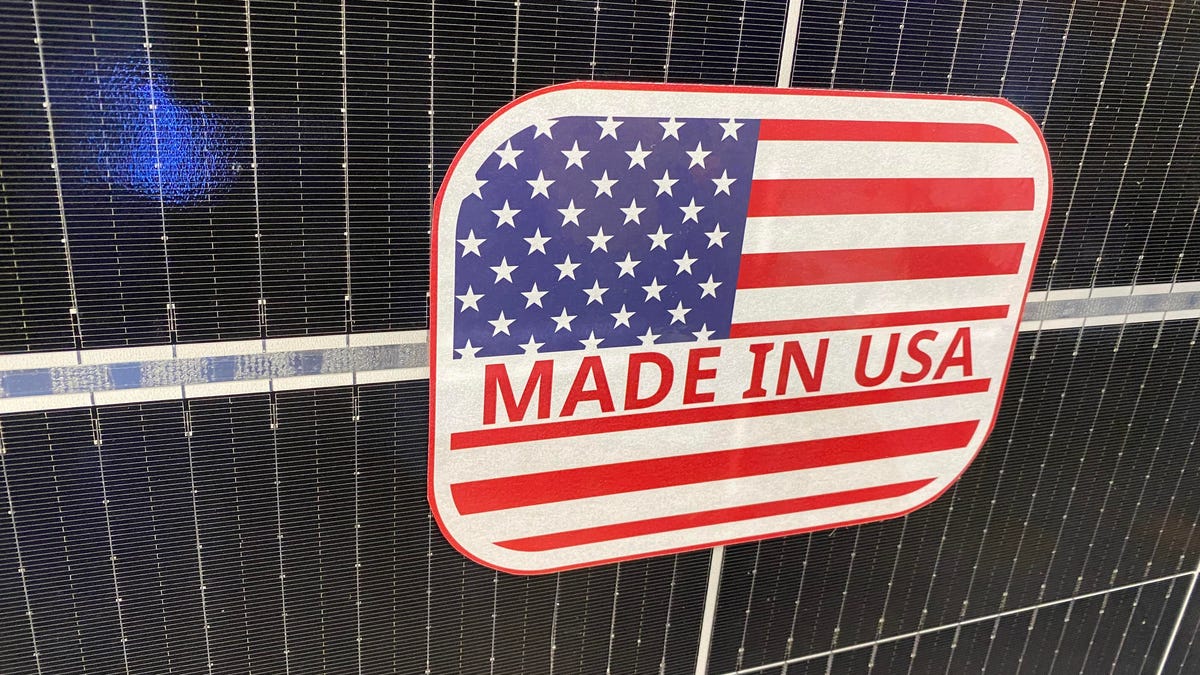There's a Tax Credit for US-Made Solar Panels, but They're Hard to Find
Most solar panels are manufactured in China, or at least their components are. Here's what you need to know if you want American-made solar panels.

Companies are starting to manufacture more solar panels in the United States, like this panel by the manufacturer Canadian Solar, which was on display at the RE+ renewable energy conference in Las Vegas in September 2023.
Buying solar panels that are made in the US can earn you a nice tax credit from the federal government. If you can find them.
The federal Inflation Reduction Act offers substantial tax credits for American-made technologies that aid in the clean energy transition.
But if the government's rules around tax credits make it complicated to find a made-in-America electric vehicle, it might be even more challenging to find solar panels produced in the United States.
Can solar panels save you money?
Interested in understanding the impact solar can have on your home? Enter some basic information below, and we’ll instantly provide a free estimate of your energy savings.
"There actually aren't too many" American-made solar panels, said Tom McCalmont, CEO of Paired Power, which makes solar-powered vehicle charging stations. "The reality is virtually all the panels are made overseas."
Most solar panels are made in China. Companies headquartered in China produced 78% of all solar cells in 2019, according to a report by BloombergNEF. "The share is even higher when accounting by factory location rather than location of corporate headquarters," the report said.
This may change over the coming years as American companies get a boost from tax incentives for buying domestic-made panels and from tariffs imposed against foreign competitors. For now, options are slim when it comes to solar panels made in the US.
Is there a tax credit for buying American-made solar panels?
For starters, there's a tax credit for buying any solar panels, totaling 30% of the system's cost. That incentive, called the residential clean energy credit, was extended and expanded under the Inflation Reduction Act. It will be phased out in 2035 unless Congress extends it again.
But if your solar panels are manufactured in the US, the government will provide an additional 10% tax credit. Guidance released by the Treasury Department said products will be eligible for the bonus if all steel and iron manufacturing processes take place in the US and if a minimum percentage of the costs of manufactured products and components come from products and components mined, produced or manufactured in the US.
The requirement will "spark a flood of investment in American-made clean energy equipment and components," with more than $13 billion in new domestic manufacturing announced so far, Abigail Ross Hopper, president and CEO of the Solar Energy Industries Association, said in a statement.
"The U.S. solar and storage industry strongly supports onshoring a domestic clean energy supply chain, and today's guidance will supplement the manufacturing renaissance that began when the historic Inflation Reduction Act (IRA) passed last summer," she said.
Companies that offer solar panels made in the US
Several companies offer solar panels made in the US. Here are a few:
- Silfab, whose Silfab Elite solar panels are exclusively made in the US
- Qcells, which is owned by the South Korean company Hanwha but makes many of its solar panels in the US
- Mission Solar, a Texas-based company with manufacturing in San Antonio
- First Solar, which is headquartered in Arizona and has manufacturing facilities in Ohio and Alabama. First Solar produces panels with cadmium telluride rather than silicon
- Canadian Solar expects to start manufacturing panels at a Texas facility around the end of 2023
Most solar panels are made in China, but a growing number, like this panel being produced at a Qcells facility in Dalton, Georgia, are being manufactured in the United States. A new tax credit aims to encourage more solar companies to build their components in the US.
What to consider when buying American solar panels
Most of the world's solar panels are manufactured in China. The country's expertise in manufacturing has allowed panels to improve in both quality and cost over time. Therefore, the main reason to buy American-made panels at this point is to support American industry and possibly benefit from additional tax credits.
Most consumers opt to work with solar installers when considering adding panels to their home. Typically, installers usually offer only perhaps one or two options from their manufacturing partners. Consumers interested in buying American-made panels should inquire with installers local to their area, asking about the brand, where they're manufactured and the brand's reputation. Also, always shop around for the best price.
While the government incentives from the Inflation Reduction Act ripple through the industry, consumers should expect only a handful of American solar manufacturers to choose from.
"The IRA has helped -- it is making a difference in helping to bring manufacturing back to the US," McCalmont said. "We're all glad about that in the industry. It's not that we all like buying panels from China, it's just the reality of where we are."



